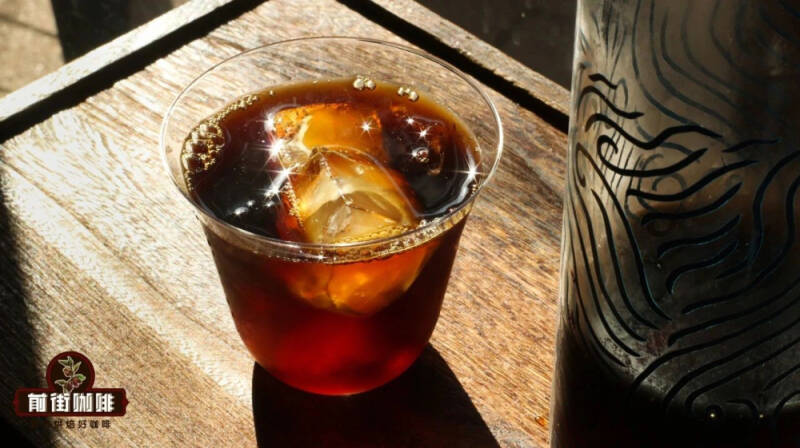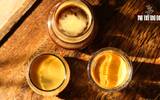How many hours does it take to brew cold extract coffee to taste good? Can I keep the cold brewed coffee overnight?

For more knowledge of fine coffee, please pay attention to the Weixin Official Accounts: Qianjie Coffee
In Qianjie's view, cold extract coffee is one of the most suitable iced coffees for making at home, because it is not only suitable for most coffee beans, but also has a very low production threshold. Even if there is no special brewing equipment at home, you can still make it. It's quite convenient to taste iced coffee.
Because it is soaked in a low-temperature environment, the extraction efficiency of soluble substances in cold extraction is very low. Compared with coffee brewed in hot water such as hand-brewed and espresso, its compatibility is significantly higher, so the corresponding parameters have a large adjustable range. Generally speaking, as long as you don't use particularly extreme parameter combinations, you can actually meet the basic extraction needs, and making a cup of iced coffee with good taste is easy.
Take the cold extraction suggestion often used in Qianjie, for example, the grinding degree should be similar to the grinding thickness of hand punch (the sieving rate of China's No. 20 sieve is 70 - 85%, and the degree of sugar is observed by the naked eye), the ratio of powder to water is 1:10 - 1:13, and the soaking time is 8 - 18 hours. We can obviously see that among the three parameters, the "soaking time" has the widest span, with a full ten hours difference. Then won't the flavor differ greatly?
To this end, Qianjie conducted a cold extraction experiment with time as a variable. Qianjie red cherry coffee with the same powder amount was ground with fine sugar (EK43s electric bean grinder scale-9.5 grids/ C40 hand-cranked bean grinder scale-22 grids) and a ratio of powder to water of 1:10, soaked for 4 hours, 10 hours, 16 hours, and 22 hours respectively, and then filtered and tasted.
Finally, it was found that among the four groups of coffee, the red cherry cold extract made in 4 hours showed the characteristics of insufficient extraction, while the coffee brewed for 22 hours showed signs of slight overextraction. The two groups of coffee brewed for 10 hours and 16 hours showed the best flavor. The latter tastes stronger than the former. Whether it is drunk directly or added ice cubes, it can show the aroma tonality of the beans themselves.
Soak for 4 hours: citric acid, slight tea feel, average taste, weak aroma
Soak for 10 hours: Bright berries are sweet and sour, with refreshing taste and moderate aroma
Soak for 16 hours: citrus acid, sweet and round, and the overall balance is very good
Soak for 22 hours: The taste is thick, the feeling of strong tea is obvious, slightly astringent, and the finish has a rustling taste
As mentioned above on Qianjie, in cold extraction, temperature is already a set parameter, and the ratio of powder and water determines the intensity of the coffee, so the remaining two factors (grinding degree and time) determine the final flavor tonality of the coffee. In other words, whether the final cold-extracted coffee is refreshing or thicker depends on the coordination of grinding degree and soaking time.
No matter which extraction method is used, the finer the coffee powder is ground and the longer the contact time with water, the more the total amount of matter released by the coffee powder into the water, and the stronger or richer the taste of the coffee will be; On the contrary, the thicker the powder is ground, the shorter the soaking time, the less the total amount of flavor substances dissolved, and the thinner the taste of the coffee will be.
However, for cold extraction, because its extraction efficiency is very low, and the coffee powder and water are in a relatively static state without external driving, if you want the carbohydrates and organic acids in the coffee powder to dissolve. If it is more fully, and then it can be more balanced and fuller in terms of acidity, sweetness and body characteristics, the first step is to appropriately extend the soaking time.
However, experience tells us that the more coffee substances are dissolved, the better. When the water extracts exceed a certain threshold, the good taste will turn into a negative effect, making the coffee taste wood, bitterness, straw and other miscellaneous flavors. Therefore, if the coffee will not be under-extracted or over-extracted, you only need to find an insurance range for the time parameter. Based on Qianjie's many years of experience in making, soak coffee for 8 to 18 hours. The taste is the safest, so how long will it take to soak it?
Considering that many people usually make cold extract for convenience, Qianjie only lists two usage scenarios for cold extract coffee based on the most common situations in life. We only need to adjust it according to our actual situation.
Scenario 1: If you want to take a cup of iced coffee out from 7 to 9 tomorrow morning, you can soak the cold extract in the refrigerator before going to bed tonight (about 9 to 12 o'clock) and filter it early the next morning. In this way, the extraction time will fall within the safe range of about 7 to 12 hours.
Scenario 2: Some partners feel that it is too tiring to go through the long filtering process early in the morning, and they are too lazy to calculate the time. So Qianjie recommends that you start making cold extract from 8 to 9 a.m., and then go back at night. Take it out at about 6 to 8 o'clock, and the last time can also be controlled within the range of 9 to 12 hours.
Not only that, cold-extracted coffee that is filtered and re-placed in the refrigerator will undergo a process of material precipitation and fermentation, making the flavor more rounded and the taste cleaner.
- END -
Important Notice :
前街咖啡 FrontStreet Coffee has moved to new addredd:
FrontStreet Coffee Address: 315,Donghua East Road,GuangZhou
Tel:020 38364473
- Prev

Lay off again! Starbucks permanently closes the world's first baking workshop!
▲ Click to pay attention| Daily Boutique Coffee Culture Magazine Coffee Factory Recently, CNN, Associated Press and other American media reported that the world-renowned coffee chain giant Starbucks announced the launch of a US$1 billion restructuring plan, closing some of its poorly operating self-operated stores and will lay off employees. Reported that
- Next

Should American coffee be poured first or second? What is the difference between American coffee and long black? Should I pour and concentrate the long black after it is poured and concentrated first?
Qianjie found that many friends are still stuck in the problem of "whether American coffee should be filled with water first or later." Because every time Qianjie produces American coffee, a friend will always ask this question: "The most authentic American way is to pour the concentrate first and then pour the water, but why do most American products now produce water first and then pour the strong?"
Related
- What grade does Jamaica Blue Mountain No. 1 coffee belong to and how to drink it better? What is the highest grade of Blue Mountain coffee for coffee aristocrats?
- What are the flavor characteristics of the world-famous coffee Blue Mountain No. 1 Golden Mantelin? What are the characteristics of deep-roasted bitter coffee?
- Can I make coffee a second time in an Italian hand-brewed mocha pot? Why can't coffee be brewed several times like tea leaves?
- Hand-brewed coffee flows with a knife and a tornado. How to brew it? What is the proportion of grinding water and water temperature divided into?
- What is the difference between Indonesian Sumatra Mantinin coffee and gold Mantinin? How to distinguish between real and fake golden Mantelin coffee?
- What does bypass mean in coffee? Why can hand-brewed coffee and water make it better?
- Unexpected! Ruixing Telunsu lattes use a smoothie machine to foam milk?!
- % Arabia's first store in Henan opens into the village?! Netizen: Thought it was P's
- Does an authentic standard mocha coffee recipe use chocolate sauce or powder? Mocha Latte/Dirty Coffee/Salty Mocha Coffee Recipe Share!
- What is the difference between Vietnam egg coffee and Norway egg coffee? Hand-brewed single product coffee filter paper filter cloth filter flat solution!

